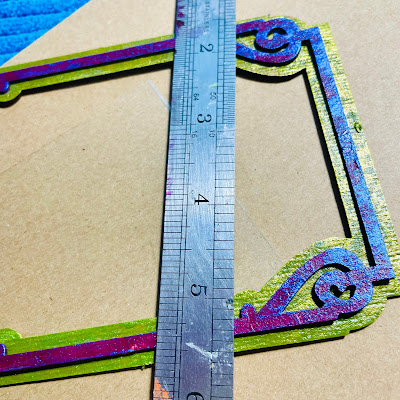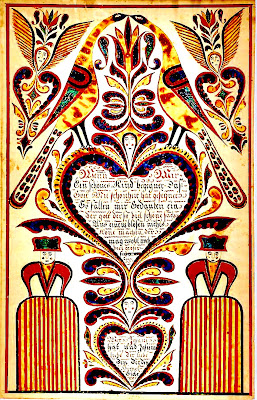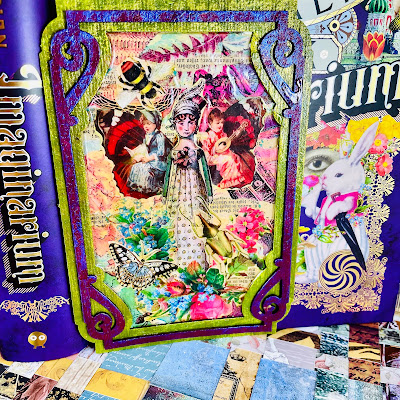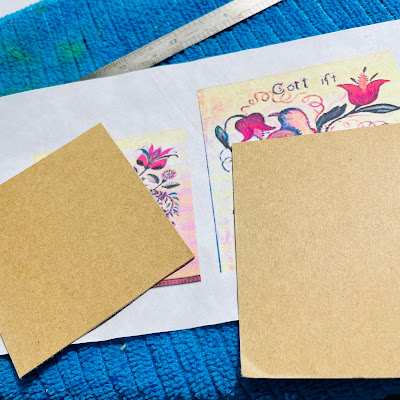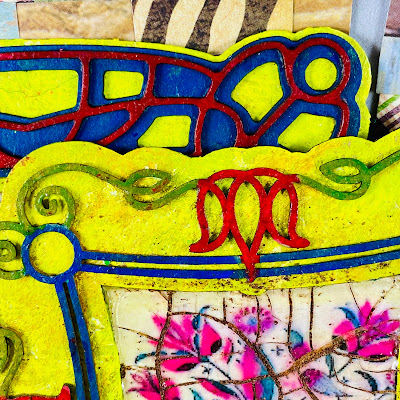Last Year I was walking through our local JOANN’s fabric and craft store and came upon this most wonderful book, Antiquarian Sticker Book: Imaginarium. It along with my love for collage and wanting to attempt a folk art assemblage is the inspiration for this artwork.
Supplies: GSLC Layered Frame Lyla, GSLC Layered Frame Skylar, Golden Quinacridone Magenta, Golden Green Gold, FolkArt ColorShift PurpleFlash, FolkArt ColorShift GreenFlash Acrylic Paints, Paintbrush,UHU GlueStick, Thin Cardboard, Ruler, Pencil, Ancient Script, Digital Manipulated Images, Antiquarian Sticker Book: Imaginarium, Scissors,Glossy Accent Clear Dimensional Medium
- Gather Supplies.
- Paint Base of GSLC Layered Frame Lyla and Top Portion of GSLC Layered Frame Skylar with Golden Quinacridone Magenta Acrylic Paint.
- Once Dry Use Dry Brush Technique to Paint Over Top with ColorShift PurpleFlash.
- Paint Top Portion of GSLC Layered Frame Lyla and Base of GSLC Layered Frame Skylar with Golden Green Gold Acrylic Paint.
- Once Dry Use Dry Brush Technique to Paint Over Top with ColorShift GreenFlash.
- Glue GSLC Layered Frames Together Using a UHU GlueStick.
- Measure a Piece of Thin Cardboard to Size of Frame to Build Your Collage Upon.
- Glue Down a Page of Ancient Text onto Cut Cardboard.

- Tear Strips or Digital Manipulated Images and Glue Them On Top of Ancient Script.
- Collect Stickers from Antiquarian Sticker Book: Imaginarium and Create a Pleasing Collage.
- Glue Prepared Collage to Back of GSLC Layered Frames and Allow to Dry Fully.
- Add a Layer of Glossy Accent Dimensional Medium.
Final Thoughts
Some Pennsylvania Dutch Sayings:
Wer lauert an der Wand, Heert sie eegni Schand.----If you listen through the wall, you will hear others recite your faults.
Der Siffer hot zu viel geleppert.----The drunkard had just sipped too much.
Alle Daag rumhersitze macht em faul.----Sitting all day makes one lazy.
Er hot en iwwerflissich lewe gfaahre.---He lived the abundant life.
Er harricht gut, awwer er foligt schlecht.---He hears well, but obeys poorly.
Some delicious Pennsylvania Dutch Dishes:
Shoofly Pie, Apple Dumplings, Whoopie Pies, Apple Butter, Hot Bacon Dressing with Dandelion Greens, Hamloaf, Lebanon Bloogna, Chicken Pot Pie, Chicken and Corn Soup, Pickled Beets, Red Beet Eggs, Beef and Noodles, Pork and Sauerkraut, Funnel Cakes and Birch Beer Just to name a few of my favorites.







